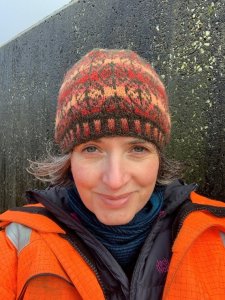PUBLISHED: 04/03/24


Findhorn, Nairn and Lossie Rivers Trust
PUBLISHED: 04/03/24
In the lead up to International Woman’s Day on 8th March 2024, we feel it is important to recognise and celebrate the work and achievements of our female colleagues, including our volunteer Board members who contribute their time and energy into the running and governance of the Findhorn Nairn and Lossie Rivers Trust.
We asked Fiona to tell us a bit about her life and work and where her passion for ecology and conservation came from, here is what she had to say;
‘My name is Fiona Strachan and I’ve recently joined the FNLRT Board. I’m looking forward very much to learning more about the wide variety of work the Trust is involved in, and to hopefully help them accomplish some of their goals. I’ve been asked to write something for International Women’s week, which takes place leading up to International Women’s Day on 8 March, so here’s a few words about my background and how I became involved in the Trust.
I have always been passionate about nature – particularly birds and wild places – and was lucky enough to grow up in Inverness with parents who were really supportive of my interests and were happy to drive me about birding at weekends. I was also a member of the most fantastic branch of the Young Ornithologist’s Club – I have many happy memories of weekends on Handa, Islay, 24 hour bird races, sitting in the snow waiting for Hen Harriers to come in to roost. This absolutely inspired me to turn my interests into a career, and I’ll always be grateful for that. I studied Zoology at Glasgow and it was a hugely inspirational place to be. The department at that time was led by two great female role models – Felicity Huntingford and Pat Monaghan – and I spent two wonderful summers studying black guillemots as part of Pat’s team of researchers on Papa Westray. The experience I gained there, and the encouragement I received during my time at Glasgow led on to other amazing opportunities including surveying cloud forest birds in Ecuador, and then on to a PhD in the Animal and Plant Sciences department of Sheffield University. I learned a huge amount during my time at Sheffield, including that it was just too far away from home for me. This was one of the reasons that led me to return to the Highlands where I spent 3 inspirational years working on Ospreys with Roy Dennis, and it’s through Roy that I’ve become involved with FNLRT. After my time with the Ospreys, I moved into ecological consultancy, worked for an environmental charity where I moved into project management and then ten years ago I moved to NatureScot where I now manage a large NLHF funded conservation programme called Species on the Edge, which aims to secure a future for 37 threatened species found on Scotland’s coasts and islands. I’ve also worked on the Scottish Wildcat Action Plan and managed the Green Infrastructure Fund. All of these have been fascinating projects to be involved in and have given me valuable experience of the challenges faced in different aspects of environmental work and partnership working, and in different parts of the country.
When Roy first asked me if I’d consider joining the FNLRT Board, I have to admit it was an organisation I didn’t know a huge amount about although I live on the banks of the River Nairn – it’s part of our daily lives. I love to hear it in the background, and of course I love to watch the wildlife that make it their home. We’re even lucky enough to see the occasional kingfisher from our kitchen window. I was aware of FNLRT through the Scottish Invasive Species Initiative but did not fully appreciate the sheer diversity of other work it delivers. When Roy started to tell me more about FNLRT, I became more and more interested. I’m particularly excited by the breadth and ambition of the Findhorn Watershed Initiative, seeing a lot of parallels between its multiple goals – combining nature restoration and community engagement – with the other projects I’ve been involved in. I’m hoping that through my place on the board I’ll be able to help the team through sharing experience and making connections.
We’re all aware of the twin nature and climate crises and it can feel overwhelming thinking about where best to focus effort, and what to prioritise. Collaboration is key and I’m already impressed with the connections FNLRT is making and look forward to seeing how they continue to make a difference to the catchments and beyond.‘
As the picture of climate change and biodiversity loss becomes clearer it reinforces our need, as an organisation, to take a holistic approach to river conservation. Fiona’s wealth of experience and knowledge will be a real asset to the Trust as we move forward with our aims and objectives and reading more about her varied life and work is a great way to kick off International Women’s Week – Thank you Fiona!